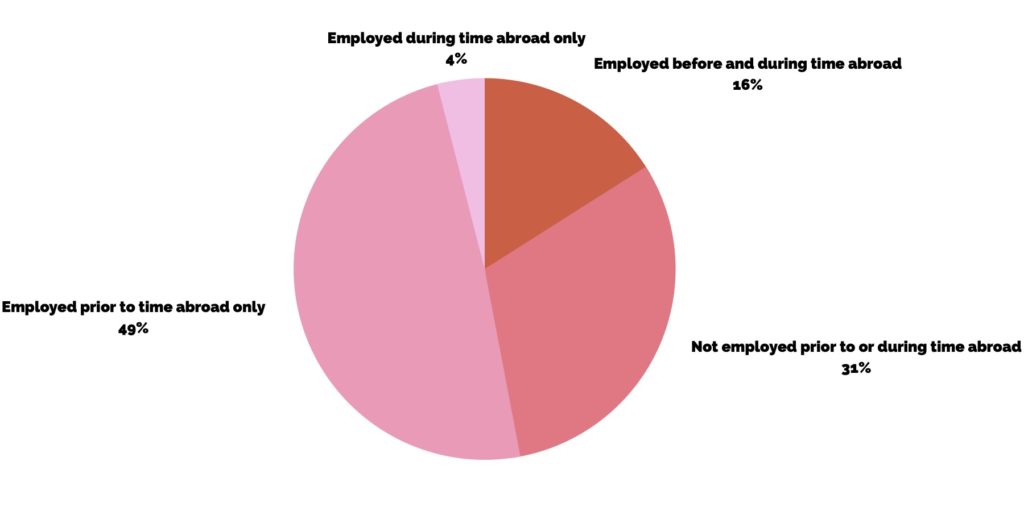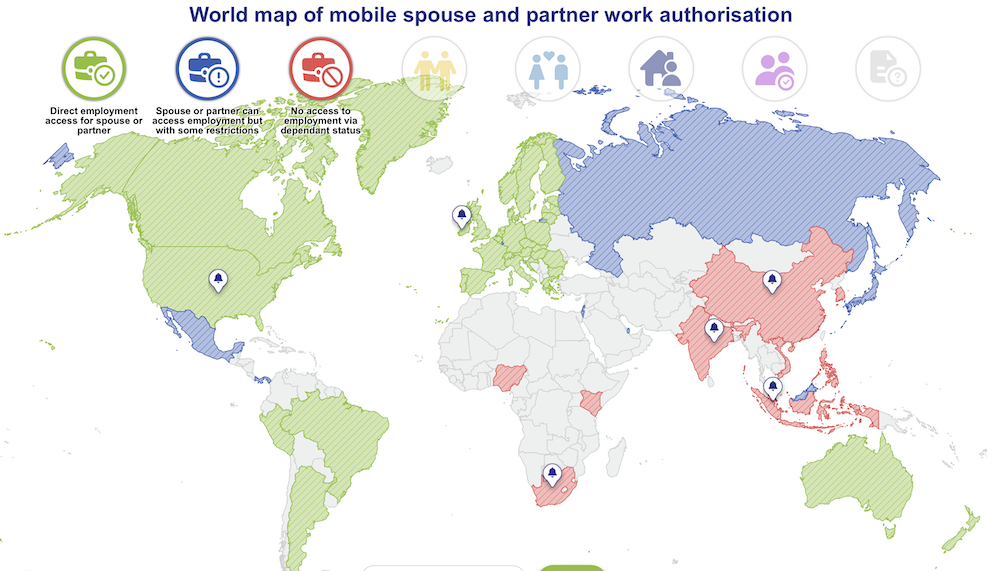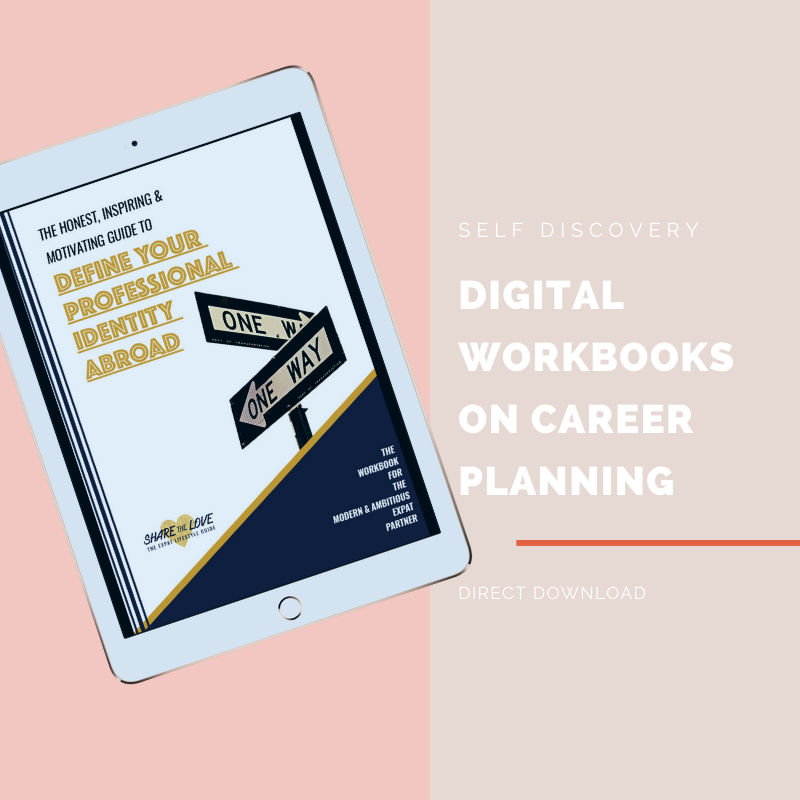
What do spouses work when moving abroad?
Learn how many expat partners are working abroad, the question of having a work permit or not and what to do when Plan A of continuing your former career does not work out.
A free resource is waiting in your inbox
Moving your career abroad or planning to re-enter the workforce after spending time with the family can be a long journey of frustration and unforeseen challenges. But no worries, there is just the right support waiting for you.
Sign-up to the SharetheLove newsletter and download your free epaper with 6 action steps to re-enter the workforce abroad. This step-for-step guide to get started is waiting for you in your inbox
The options are manifold
The thought about a move abroad is thrilling and exciting! You might be longing for change in life and seek opportunities to make that reality, or you might be in the position that your partner has a job offer abroad, and you are wondering whether it is a good idea to tag along.
Either way, you most likely want to prepare yourself for the journey ahead and want to make an informed decision.
You keep wondering what to do with your career when moving abroad and how you can enter an unfamiliar job market in a foreign cultural environment.
If you are wondering about your potential options, you already took an essential first step: You acknowledged that there are several options and not only one. Many expat partners move abroad with this ONE plan they aim to execute and find themselves confronted with totally unexpected barriers.
So let me share some vital information on the job situation of the expat partner abroad for you. This is one step in your journey of having a thriving career abroad: Accessing information. When you are ready to take matters into your own hands and define your own personalized master plan, get in touch for more details on my 1:1 coaching program! You can schedule a free discovery call here, and I am happy to walk you through the jungle of information out there and explain how I can help you with your specific situation.
Do spouses work at all when following their partner abroad?
The numbers are much lower than you might expect them to be. While most expat partners are highly educated, fluent in several languages, and already prove their competence in a compelling CV, the actual percentage of women continuing their career abroad is 16%.
16% of expat partners had a career before moving abroad and could continue their careers abroad. 31% of expat partners were not before nor during expatriation employed, 4% were only employed during expatriation but not before, and the vast majority of 49% was employed before moving abroad.

Source: BGRS (2016) Breakthrough to the Future of Global Talent Mobility: 2016 Global Mobility Trends Survey. Brookfield Global Relocation Services
Are you allowed to work?
I have met many expat partners who were not employed without a work permit, but who used their time abroad very well to pick up where they left off in their old career or to take a completely new path when they returned to their home country. And I have met expat partners who were unable to find a job on their own despite having a work permit. Even after countless applications, the job market did not open up for them and they needed coaching to find out what the problem was in their particular case.
Would you like to know if you yourself will have a work permit in the respective country? Then I recommend you to have a look here. The Permits Foundation has made it their goal to fight for equal access to the labor market for expat partners and has created a very useful map that summarizes the situation. Here you can see this map.

A free resource is waiting in your inbox
Moving your career abroad or planning to re-enter the workforce after spending time with the family can be a long journey of frustration and unforeseen challenges. But no worries, there is just the right support waiting for you.
Sign-up to the SharetheLove newsletter and download your free epaper with 6 action steps to re-enter the workforce abroad. This step-for-step guide to get started is waiting for you in your inbox
What do spouses work abroad?
Let’s get to the core question, then. In case you have decided to go abroad, what could you do? Obviously, there is always the possibility of taking your career with you and keeping doing what you were doing. But you would not be reading this post if it is as simple as that. You want to know what else would be possible, and you want to prepare for the scenario when this is not an option. So what Plan B, C, and D could be waiting for you then?
Well, it is up to you. My clients keep surprising me in ways they follow their passion for work projects abroad, and every story is unique. Hence, the following list should be seen as a source for inspiration but by no means as a finished list of options.
So what Plan B, C, and D could be waiting for you then?
Options:
Continuing former career
If you are allowed to work abroad, it is obvious to turn to the local job market. Check if it is possible to have your certificates and education recognized abroad. Research what work experience is necessary for your desired profession. Update your resume and LinkedIn profile, research local practices on the application process or find a coach to guide you along the way.
Further ideas:
- Search for employees with a need for your native language
- Search for employees with a need for your native language
- Look for international companies or companies with a start-up culture
Start a portable business
For some Expat Partners, a corporate career does not offer enough flexibility regarding mobility or family life. If this is not the only expat destination, it might make sense to think about a portable career for yourself—something you can take with you when there is a next move around the corner.
Further ideas:
- Check in with your entrepreneurial side. Is that matching your core values and life purpose?
- Research what makes a business truly portable
Teaching at an international school
If you are fluent in English, teaching at an international school can be a great option to be flexible but earn money simultaneously. There are over 6,600 international schools worldwide, and the number is rising. Nowadays, these schools also attract locals due to their excellent reputation for having a high learning standard. There is more demand for teachers with a background in English than ever before. It’s also a great job to take with you in case serial expatriation is a topic. Short-term contracts are pretty standard and offer flexibility for both sides. The downside: Serious certification is needed to teach at international schools. If you are not an English native speaker, language schools that focus on the non-native speaker are also an option. These schools usually accept the TEFL test as certification.
Further ideas:
- Search for employees with a need for your native language
- Search for employees with a need for your native language
- Look for international companies or companies with a start-up culture
Start a portable business
For some Expat Partners, a corporate career does not offer enough flexibility regarding mobility or family life. If this is not the only expat destination, it might make sense to think about a portable career for yourself—something you can take with you when there is a next move around the corner.
Further ideas:
- Look for international schools in your new potential home
- Look for language schools, online courses
Freelancing
If you don’t want to start a comprehensive business on your own, there are still several options that allow you to work from wherever you are but keep your clients and tasks. Freelancing is super trendy amongst Digital Nomads as this type of profession enables you to live a location-independent professional life. A freelancer can legally work in most countries. This means that as long as you don’t serve local clients and operate only virtually, you should not have issues.
Further ideas:
- Social Media Managers
- Copywriter
- Consultant
- App Developer
- UX Design
- Virtual Assistance
- ...
Educational Development
If work permits are an issue but you want to continue working on your career, going back to university might be the path to follow. A foreign degree can have a profoundly positive impact on your job outlook back home. Many big corporations are open to funding an educational degree abroad for the Expat Partner. Going back to university or training yourself in workshops can be a good idea. If your partner’s company is not offering a massive Expat Package to train yourself, there are still plenty of free or very favorable online courses you can take no matter where you are living now.
Further ideas:
- www.coursera.com
- www.edx.org
- www.skillshare.com
- www.futurelearn.com
Volunteering
Many Expats end up volunteering when other options have not been successful. However, my experience shows that volunteering has by far a worse reputation than it should be. Instead of seeing it as something that always seems possible, you should see it as a valid entry ticket to a foreign job market and an authentic cultural training court. Some of my clients found their dream job through volunteering and were able to upskill heavily in a short amount of time while staying available to the job market.
Further ideas:
- Do it strategically: Do not invest your time and energy in any volunteering project but look for the connection to your dream job
- Define your conditions - how much time and energy are you willing to commit and what do you like to get out of it?
Internship
When you reach a certain career level, it might feel strange to think about internships as a valid approach to a foreign job market. However, similar to the volunteering sector, this gives you a potential entry ticket when entry barriers are otherwise really high. So think twice before saying, “I am too experienced for that.” This might also be the best opportunity to switch career paths! However, please consider that most countries can only hire you for an internship when you are enrolled in an academic degree.
Further ideas:
- Check legal requirements for an internship in your new country
- Choose companies which offer you the desired career switch or to learn skills you always wanted to gain, but it was never matching your old career path
Turning a passion into a career
Your time abroad can also be very fulfilling beyond the typical work patterns. It can be the best time to realize an idea or skill that is not yet a straightforward business idea but can develop itself.
Further ideas:
- Write that book you always wanted to write
- Start a blog and monetize it
- Improve your photography skills and sell your images
- Develop an interest in health and happiness topics (which often develop into a serious business approach over time)
Do you feel like tackling the project abroad the right way? Take the shortcut and book a coaching session with me to discuss your options, find out what you really want, and develop a battle plan on how to reach your goal. We will work together intensively for 3 months on your journey and get you ready for the adventure abroad. You can find more information about my individual coaching program here. Feel free to book a free Discovery Call where you tell me more about your situation, I present you my concept and you can think about it afterward. I look forward to hearing from you!











